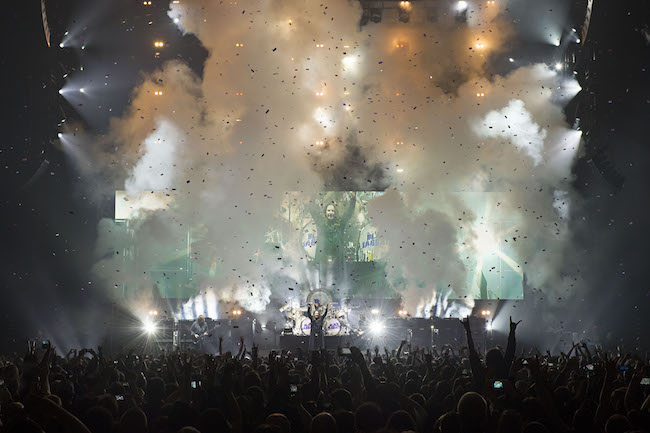Rock Review: Black Sabbath, Adieu
Black Sabbath wasn’t reaching out to the rebels or the hippies; instead, the band catered to the outsiders and the misfits.

Singer Ozzy Osbourne performing live in 2016. Photo: Ross Halfin.
By Scott McLennan
Black Sabbath figured out exactly what it wanted to do by the time the band released its debut album in 1970. Singer Ozzy Osbourne, guitarist Tony Iommi, bassist Geezer Butler, and drummer Bill Ward were determined to conjure up a dark, brooding sound that was neither beholden to the blues that gave birth to rock ’n’ roll nor to the feel-good dance groove other bands specialized in at the time.
Black Sabbath wasn’t reaching out to the rebels or the hippies; instead, the band catered to the outsiders and the misfits. Sabbath made a career out of cobbling a worldview out of the perspective of someone who has the odds stacked against him, never earning anything close to a triumphant, inspiring ending.
That unique sound was maintained through eight albums that served as the blueprint for heavy metal as a genre. Then things became rocky for the band after 1978’s Never Say Die!, with Osbourne departing and Iommi holding the Black Sabbath brand together with a shifting cast of players for 20 years before the original members finally reunited.
Intermittent reunions by the original members have continued …until now. Black Sabbath is now on its final tour, which passed through the Xfinity Center in Mansfield, MA on August 25 and will be at Mohegan Sun in Connecticut on Saturday, August 27. It would have been nice to have Ward in the lineup for posterity’s sake, but he and his bandmates had a falling out. Still, replacement Tommy Clufetos, a younger and more aggressive player from Osbourne’s solo band, gave the Sabbath sound a beneficial kick.
Black Sabbath started the show by going to track one from album one; the song “Black Sabbath” from the album of the same name. The dirge-to-surge dynamic of “Black Sabbath” cropped up throughout the night, just as it has been a central motif running throughout the band’s entire catalog.
As a vocalist, Osbourne split his time between singing and talking-in-melody. It’s a style he can pull off because he still manages to inhabit the songs, conjuring all the despair and dread that defines the Sabbath sound. If he fell out of key or the instrumental tone got too sludgy, the band ably put things back on track in short order.
Black Sabbath drew on songs mainly from its first two albums; nothing released past 1976 was played. Yet these 40-plus-year-old tunes stood up remarkably well. A deftly played “Hand of Doom,” about the dead end of heroin addiction, could easily be a comment on yesterday’s opioid-crisis headlines. The damning of hawkish politicians in “War Pigs” sounded as relevant today as it was in 1971.

Black Sabbath live, 2016. Photo: Ross Halfin.
And for a band that has attained legend status, appealing to genteel fans as well as to head bangers, Black Sabbath hasn’t bothered to smooth over the sharp edges. The Rolling Stones, for instance, stopped singing the “Who killed the Kennedys” line in “Sympathy for the Devil” years ago. But Sabbath still asks ‘if you’d like to see the Pope on the end of a rope’ in its call-to-faith tune “After Forever.”
The seamless interplay between Iommi and Butler will be sorely missed. Each has a signature sound and style that perfectly blends with the other. Their chemistry generated a string of great records featuring Ronnie James Dio after Osbourne’s first departure from Sabbath. While Butler typically contributes plenty of thundering menace, he veered into a bit of metallic funk during a solo that bridged “Behind the Wall of Sleep” and “N.I.B.” And for all of the classic riffs he’s created, Iommi was most impressive Thursday playing an aching solo on the cut “Dirty Women.”
“The End” tour supplies a fitting farewell, showcasing the myriad elements that make up Black Sabbath’s mordant premise. It’s amusing to think about what a bad influence the band was once thought to be. The songs about drugs don’t have happy endings (unless you’re OK spending your days zonked out watching boot-wearing fairies). And there are all sorts of allusions to a righteous God punishing the wicked. Appeals of Satan are to be avoided. The truth is, these are good boys, really, who just happen to enjoy peering into the murk and writing songs about when things go terribly wrong, like the poor plight of “Iron Man,” a noble space traveler turned to steel and then shunned as a freak upon his return home. Black Sabbath was an essential rock and roll band for the freak in all of us.
Scott McLennan covered music for the Worcester Telegram & Gazette from 1993 to 2008. He then contributed music reviews and features to The Boston Globe, The Providence Journal, The Portland Press Herald and WGBH, as well as to the Arts Fuse. He also operated the NE Metal blog to provide in-depth coverage of the region’s heavy metal scene.
Tagged: Bill Ward, Black Sabbath, Geezer Butler, Ozzy Osbourne, Scott McLennan
